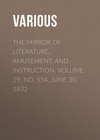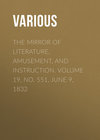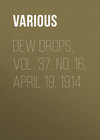Loe raamatut: «The Mirror of Literature, Amusement, and Instruction. Volume 10, No. 288, Supplementary Number», lehekülg 5
As the clock struck eight, Molly was standing beside her master before the rails of the marriage-altar; and, not long after, she burst upon the astonished eyes of her sister, as Mrs. Vanderclump.
La Villegiatura is a pleasant article; but we do not think there is much of the "love of pastoral associations" left in the English character, and we are sorry for it. The Rustic Wreath, by Miss Mitford, is very sweet; the Cacadore, a story of the peninsular war, is a soul-stirring narrative; there is much pleasantry in Mrs. Hofland's Comforts of Conceitedness; Virginia Water, by the editor, could hardly be written by his fireside—it has too much local inspiration in every line; Auguste de Valcour, by the author of Gilbert Earle, is in his usual felicitous vein of philosophic melancholy; Miss Roberts has a glittering Tale of Normandy; the Orphans, by the editor, is simple and pathetic; Palinodia we subjoin:—
There was a time when I could feel
All passion's hopes and fears,
And tell what tongues can ne'er reveal,
By smiles, and sighs, and tears.
The days are gone! no more, no more,
The cruel fates allow;
And, though I'm hardly twenty-four,
I'm not a lover now.
Lady, the mist is on my sight,
The chill is on my brow;
My day is night, my bloom is blight—
I'm not a lover now!
I never talk about the clouds,
I laugh at girls and boys,
I'm growing rather fond of crowds,
And very fond of noise;
I never wander forth alone
Upon the mountain's brow;
I weighed, last winter, sixteen stone,—
I'm not a lover now!
I never wish to raise a veil,
I never raise a sigh;
I never tell a tender tale,
I never tell a lie;
I cannot kneel as once I did;
I've quite forgot my bow;
I never do as I am bid,—
I'm not a lover now!
I make strange blunders every day,
If I would be gallant,
Take smiles for wrinkles, black for grey.
And nieces for their aunt;
I fly from folly, though it flows
From lips of loveliest glow;
I don't object to length of nose,—
I'm not a lover now!
The muse's steed is very fleet—
I'd rather ride my mare;
The poet hunts a quaint conceit—
I'd rather hunt a hare;
I've learnt to utter yours and you
Instead of thine and thou;
And oh! I can't endure a Blue!—
I'm not a lover now!
I find my Ovid dry,
My Petrarch quite a pill,
Cut Fancy for Philosophy,
Tom Moore for Mr. Mill;
And belles may read, and beaux may write,
I care not who or how;
I burnt my album Sunday night,—
I'm not a lover now!
I don't encourage idle dreams
Of poison or of ropes,
I cannot dine on airy schemes,
I cannot sup on hopes:
New milk, I own is very fine,
Just foaming from the cow;
But yet I want my pint of wine,—
I'm not a lover now!
When Laura sings young hearts away,
I'm deafer than the deep;
When Leonora goes to play,
I sometimes go to sleep;
When Mary draws her white gloves out,
I never dance, I vow:
"Too hot to kick one's heels about!"—
I'm not a lover now!
I'm busy now with state affairs,
I prate of Pitt and Fox;
I ask the price of rail-road shares,
I watch the turns of stocks:
And this is life! no verdure blooms
Upon the withered bough.
I save a fortune in perfumes,—
I'm not a lover now!
I may be yet what others are,
A boudoir's babbling fool;
The flattered star of bench or har,
A party's chief or tool:
Come shower or sunshine, hope or fear,
The palace or the plough—
My heart and lute are broken here,—
I'm not a lover now!
Lady, the mist is on my sight,
The chill is on my brow;
My day is night, my bloom is blight,—
I'm not a lover now!
The First Ball, by L.E.L. is rife and gay; which, with Mr. Croker's Three Advices, are all we can spare room to point out to our readers.
The Amulet
Of this volume we have already availed ourselves. Some of the engravings are in a vigorous and first-rate style of excellence; the binding, too, is somewhat gay for so grave a title—being crimson silk. Our favourites are a Voyage Round the World, by Montgomery, one of the best poems of the year; Faustus, with a Visit to Goethe; Angel Visits, by Mrs. Hemans; The Departed, by L.E.L.; and some pieces by the editor, Mr. Hall. Our present extract is
THE LAST VOYAGE. A TRUE STORY
By Mrs. Opie.
We cannot fail to observe, as we advance in life, how vividly our earliest recollections recur to us, and this consciousness is accompanied by a melancholy pleasure, when we are deprived of those who are most tenderly associated with such remembrances, because they bring the beloved dead "before our mind's eye;" and beguile the loneliness of the present hour, by visions of the past. In such visions I now often love to indulge, and in one of them, a journey to Y– was recently brought before me, in which my ever-indulgent father permitted me to accompany him, when I was yet but a child.
As we drove through C–r, a village within three miles of Y–, he directed my attention to a remarkable rising, or conical mound of earth, on the top of the tower of C–r church. He then kindly explained the cause of this singular, and distinguishing appearance, and told me the traditionary anecdote connected with it; which now, in my own words, I am going to communicate to my readers.
It is generally supposed, that great grief makes the heart so selfishly absorbed in its own sufferings, as to render it regardless of the sufferings of others; but the conduct of her, who is the heroine of the following tale, will prove to this general rule an honourable exception.
I know nothing of her birth, and parentage, nor am I acquainted even with her name—but I shall call her Birtha—the story goes, that she lived at C–r, a village three miles from Y– in N–, and was betrothed to the mate of a trading vessel, with the expectation of marrying him, when he had gained money sufficient, by repeated voyages, to make their union consistent with prudence.
In the meanwhile, there is reason to believe that Birtha was not idle, but contrived to earn money herself, in order to expedite the hour of her marriage; and at length, her lover (whom I shall call William) thought that there was no reason for him to continue his sea-faring life, but at the end of one voyage more, he should be able to marry the woman of his choice, and engage in some less dangerous employment, in his native village.
Accordingly, the next time that he bade farewell to Birtha, the sorrow of their parting hour was soothed by William's declaring, that, as the next voyage would be his last, he should expect, when he returned, to find every thing ready for their marriage.
This was a pleasant expectation, and Birtha eagerly prepared to fulfil it.
By the time that Birtha was beginning to believe that William was on his voyage home, her neighbours would often help her to count the days which would probably elapse before the ship could arrive; but when they were not in her presence, some of the experienced amongst the men used to express a hope, the result of fear, that William would return time enough to avoid certain winds, which made one part of the navigation on that coast particularly dangerous.
Birtha herself, had, no doubt, her fears, as well as her hopes; but there are some fears which the lip of affection dares not utter, and this was one of them.
Birtha dreaded to have her inquiries respecting that dangerous passage, answered by "Yes, we know that it is a difficult navigation;" she also dreaded to be told by some kind, but ill-judging friends, to "trust in Providence;" as, by such advice, the reality of the danger would be still more powerfully confirmed to her. This recommendation would to her have been needless, as well as alarming; for she had, doubtless, always relied on Him who is alone able to save, and she knew that the same "Almighty arm was underneath" her lover still, which had hitherto preserved him in the time of need.
Well—time went on, and we will imagine the little garden before the door of the house which Birtha had hired, new gravelled, fresh flowers sown and planted there; the curtains ready to be put up; the shelves bright with polished utensils; table linen, white as the driven snow, enclosed in the newly-purchased chest of drawers; and the neat, well chosen wedding-clothes, ready for the approaching occasion: we will also picture to ourselves, the trembling joy of Birtha, when her eager and sympathizing neighbours rushed into her cottage, disturbing her early breakfast, with the glad tidings, that William's ship had been seen approaching the dangerous passage with a fair wind, and that there was no doubt but that he would get over it safe, and in day-light! How sweet is it to be the messenger and the bearer of good news, but it is still sweeter to know that one has friends who have pleasure in communicating pleasure to us!
But Birtha's joy was still mingled with anxiety, and she probably passed that day in alternate restlessness and prayer.
Towards night the wind rose high, blowing from a quarter unfavourable to the safety of the ship, and it still continued to blow in this direction when night and darkness had closed on all around.
Darkness at that moment seemed to close also upon the prospects of Birtha! for she knew that there was no beacon, no landmark to warn the vessel of its danger, and inform the pilot what coast they were approaching, and what perils they were to avoid; and, it is probable, that the almost despairing girl was, with her anxious friends, that livelong night a restless wanderer on the nearest shore.
With the return of morning came the awful confirmation of their worst fears!
There was no remaining vestige of William's vessel, save the top of the mast, which shewed where it had sunk beneath the waves, and proved that the hearts which in the morning had throbbed high with tender hopes and joyful expectations were then cold and still "beneath the mighty waters!" How different now was the scene in Birtha's cottage, to that which it exhibited during the preceding morning.
That changed dwelling was not indeed deserted, for sympathizing neighbours came to it as before; but though many may be admitted with readiness when it is a time for congratulation, it is only the few who can be welcome in a season of sorrow; and Birtha's sorrow, though quiet, was deep—while neither her nearest relative, nor dearest friend, could do any thing to assist her, save, by removing from her sight the new furniture, or the new dresses, which had been prepared for those happy hours that now could never be hers.
At length, however, Birtha, who had always appeared calm and resigned, seemed cheerful also! still she remained pale, as in the first moments of her trial, save when a feverish flush occasionally increased the brightness of her eyes; but she grew thinner and thinner, and her impeded breath made her affectionate friends suspect that she was going into a rapid decline.
Medical aid was immediately called in, and Birtha's pleased conviction that her end was near, was soon, though reluctantly confirmed to her, at her own request.
It is afflicting to see an invalid rejoice in knowing that the hour of death is certainly approaching; because it proves the depth and poignancy of the previous sufferings: but then the sight is comforting and edifying also. It is comforting, because it proves that the dying person is supported by the only "help that faileth not;" and it is edifying, because it invites those who behold it to endeavour to believe, that they also may live and die like the departing Christian.
But it was not alone the wish "to die and be with Christ," nor the sweet expectation of being united in another world to him whom she had lost, that was the cause of Birtha's increasing cheerfulness, as the hour of her dissolution drew nigh. No—
Her generous heart was rejoicing in a project which she had conceived, and which would, if realized, be the source of benefit to numbers yet unborn. She knew from authority which she could not doubt, that had there been a proper landmark on the shore, her lover and his ship would not, in all human probability, have perished.
"Then," said Birtha, "henceforth there shall be a land-mark on this coast! and I will furnish it! Here at least, no fond and faithful girl shall again have to lament over her blighted prospects, and pine, and suffer as I have done."
She sent immediately for the clergyman of the parish, made her will, and had a clause inserted to the following effect: "I desire that I may be buried on the top of the tower of C–r church! and that my grave may be made very high, and pointed, in order to render it a perpetual land-mark to all ships approaching that dangerous navigation where he whom I loved was wrecked. I am assured, that, had there been a land-mark on the tower of C– church, his ship might have escaped; and I humbly trust, that my grave will always be kept up, according to my will, to prevent affectionate hearts, in future, from being afflicted as mine has been; and I leave a portion of my little property in the hands of trustees, for ever, to pay for the preservation of the above-mentioned grave, in all its usefulness!"
Before she died, the judicious and benevolent sufferer had the satisfaction of being assured, that her intentions would be carried into effect.
Her last moments were therefore cheered by the belief, that she would be graciously permitted to be, even after death, a benefit to others, and that her grave might be the means of preserving some of her fellow-creatures from shipwreck and affliction.
Nor was her belief a delusive one–The conical grave in question gives so remarkable an appearance to the tower of C–r church, when it is seen at sea, even at a distance, that if once observed it can never be forgotten, even by those to whom the anecdote connected with it is unknown —therefore, as soon as it appears in sight, pilots know that they are approaching a dangerous coast, and take measures to avoid its perils.




















